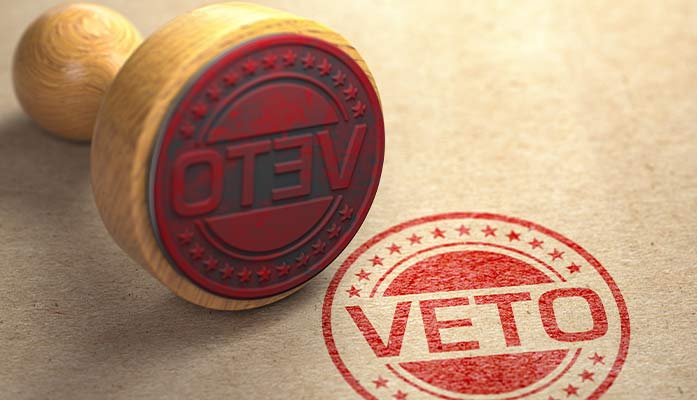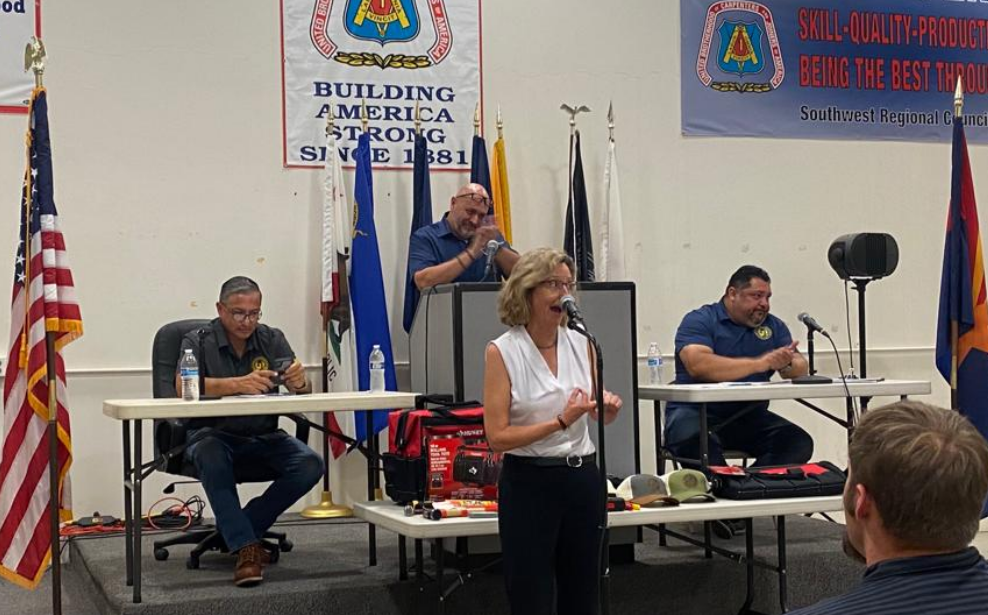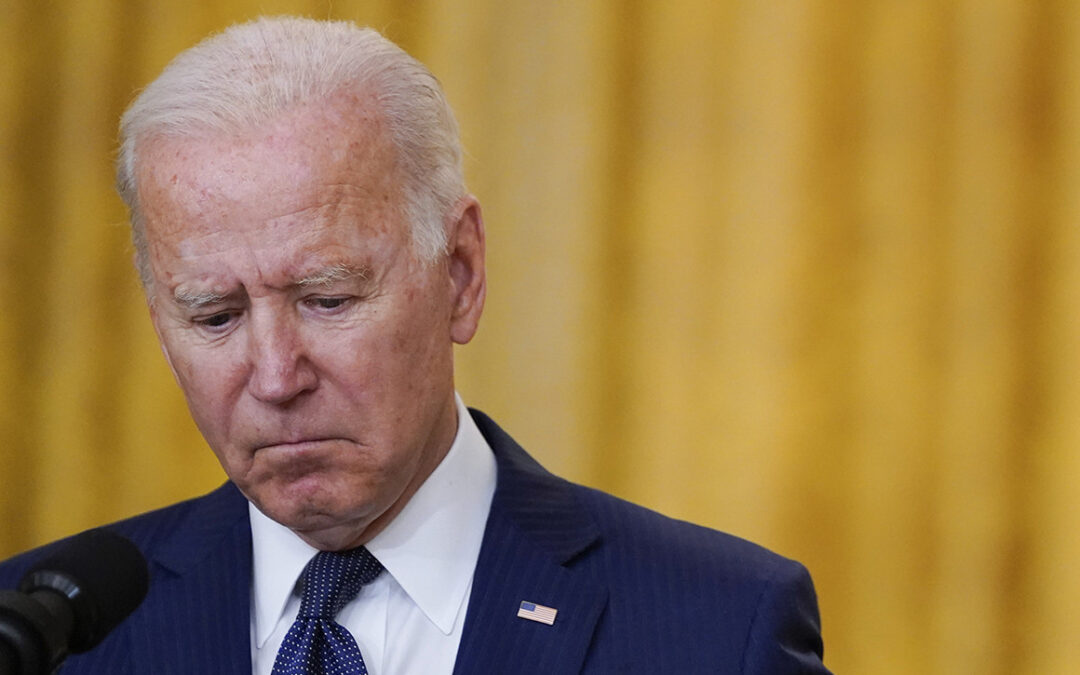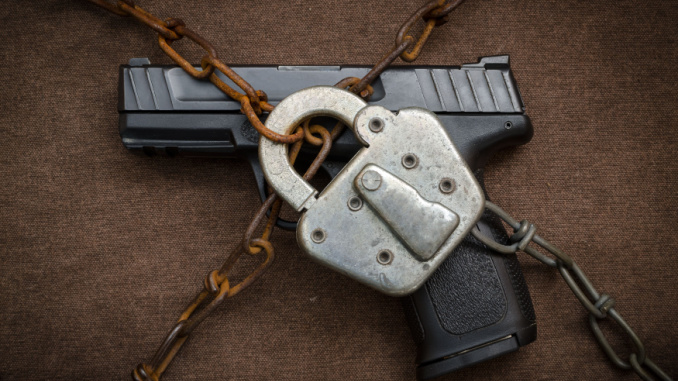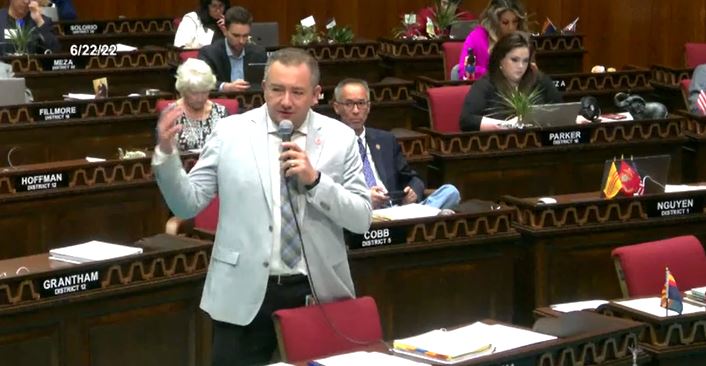
by Daniel Stefanski | Mar 19, 2024 | Economy, News
By Daniel Stefanski |
A bipartisan housing bill from the Arizona State Legislature has met its demise.
On Monday, Democrat Governor Katie Hobbs vetoed HB 2570, which would have “create[ed] municipal prohibitions relating to home designs and single-family home lot sizes” – according to the overview provided by the state House.
In a letter explaining her veto to House Speaker Ben Toma, Hobbs said, “I was elected on a promise to bring thoughtful leadership to the Governor’s Office and always do the right thing for the people of this state, even when it’s hard. Unfortunately, this expansive bill is a step too far and I know we can strike a better balance. This is unprecedented legislation that would put Arizonans at the center of a housing reform experiment with unclear outcomes. It lacks the nuance necessary for statewide reform, and I do not believe it is in the best interest of the people in this state.”
Senate President Warren Petersen blasted the governor’s decision on the bill, writing, “Our kids can’t afford a home. Today, the Governor sided with bureaucrats, instead of our kids. Thanks to her, affordable starter homes remain illegal in Arizona. But it’s not just our kids. Every day, we hear from active-duty military, veterans, young families, young professionals, firefighters, teachers, police officers, service workers, and seniors on fixed incomes that they are either facing the grim reality of becoming homeless or are being prevented from participating in the American dream of homeownership because of outrageous prices, partly due to reckless big government regulations imposed by cities and towns.”
The Senate Republican Caucus’ press release highlighted that Hobbs became the “first Governor in the nation to block a bill removing zoning restrictions to bring housing prices down for hardworking citizens.” The release asserted that “the status quo currently limits options, which can tack on tens of thousands of dollars to the sale price of a home.”
Hobbs pointed to push back from the Department of Defense and Professional Fire Fighters of Arizona over the bill, which she claimed to take under advisement in the lead-up to her veto. She added, “The bill has unexplored, unintended consequences that are of great concern. For instance, the Department of Defense contacted my office while this bill was on my desk to state their opposition. They expressed very serious concerns that the increased density near military installations would put military operations and homeowners at risk, putting dense development within Accident Potential Zones. Firefighters shared significant public safety concerns highlighting that increased density without corresponding improvements to roads and public infrastructure could lead to traffic congestion during evacuations or delays in emergency response times. These are the examples that demonstrate the potential risks that come with the kind of sweeping reforms in this proposal.”
Petersen countered these concerns from Hobbs as part of his statement in response to the veto. He said, “The Governor has a track record of pushing red herrings to justify her vetoes against commonsense legislation, and her statement today is no different. No, this bill does not harm military operations, nor create safety issues for cities. Instead of listening to the citizens, she’s listening to the people who created the problem. This legislation had strong bipartisan support, and this veto will certainly go down as one of her biggest failures.”
Other legislative Democrats expressed their disappointment over the veto. Representative Analise Ortiz stated, “I am deeply saddened and disappointed in the Governor’s decision to veto the Arizona Starter Homes Act. HB 2570 was a historic bipartisan solution to our state’s housing crisis and it would have created a pathway to the American dream of homeownership. While other states are proactively addressing housing in an urgent, deliberate manner, AZ continues to kick the can down the road. Status quo is clearly not working and believing that things will change without policies like the Starter Homes Act is, at best, wishful thinking. I hope Governor Hobbs will support future plans to expand the state’s inventory of modest, starter homes and homes on small lots – homes that our parents & grandparents purchased years ago that allowed them to build wealth, lay roots in communities, and break cycles of poverty.”
Democrat State Senator Anna Hernandez also weighed in about the governor’s veto. She said, “I hope the Governor takes this moment to reaffirm her commitment to solving the housing crisis rather than stand as another obstacle in the way of solutions. My hope is that Governor Hobbs and her staff, learn from their mistake today, and ensure that decisions on policy are made for the betterment of all Arizonans. We must prioritize the people over the politics. The work we have begun will continue – I promise.”
HB 2570 is likely completely dead for the legislative session, with no hope for a veto override, as only 33 State Representatives and 16 State Senators supported its passage in their chambers.
Daniel Stefanski is a reporter for AZ Free News. You can send him news tips using this link.

by Corinne Murdock | Mar 19, 2024 | News
By Corinne Murdock |
Arizona Democratic congressional candidate Kirsten Engel implied that Trump’s recent use of the common “bloodbath” metaphor was a call to violence.
The congressional candidate didn’t come to the conclusion on her own. Engel played off viral claims made in the media by the Biden-Harris campaign and top Democrats. She used the media storm on the former president as an opportunity to condemn her opponent, incumbent Juan Ciscomani (R-AZ-06), for not rebuking Trump’s rhetoric. Ciscomani endorsed Trump earlier this month.
“Just one week after my opponent endorsed him, President Trump warns of a ‘bloodbath’ if he’s not elected in Nov,” said Engel. “Predictably my opponent remains silent. Time and again he’s demonstrated an unwillingness to stand up to extremism. #AZ06 deserves better.”
Democrats and legacy media claimed that Trump mentioned a “bloodbath” in a political rally Saturday night as a promise of violence should he lose the election, many comparing the rhetoric to the 2021 Capitol breach. However, the former president was warning that his loss in the upcoming presidential race would result in a “bloodbath” for the country’s auto industry, as well as the entire economy.
“Those big monster car manufacturing plants that you’re building in Mexico right now, and you think you’re gonna get that, you’re gonna not hire Americans and you’re gonna sell the cars to us. No, we’re going to put a 100 percent tariff on every single car that comes across the line. And you’re not gonna be able to sell those cars; if I get elected. Now, if I don’t get elected, it’s gonna be a bloodbath for the whole – that’s gonna be the least of it, it’s gonna be a bloodbath for the country. That’ll be the least of it. But they’re not going to sell those cars; they’re building massive factories.”
The “bloodbath” metaphor is a popular one employed often by politicians, and even the same outlets that have now criticized Trump for its usage.
The Biden-Harris campaign also accused Trump of eliciting violence. James Singer, the campaign’s spokesman, passed on a statement to numerous outlets from a press release claiming that Trump was trying to start another January 6 incident.
“This is who Donald Trump is: a loser who gets beat by over 7 million votes and then instead of appealing to a wider mainstream audience doubles down on his threats of political violence,” said Singer. “He wants another January 6, but the American people are going to give him another electoral defeat this November because they continue to reject his extremism, his affection for violence, and his thirst for revenge.”
Biden’s team also issued a response directly from him with a similar accusation.
“It’s clear this guy wants another January 6,” stated Biden.
The campaign’s communications director, Michael Tyler, also put out the accusation in an interview with former White House spokeswoman Jen Psaki.
Corinne Murdock is a reporter for AZ Free News. Follow her latest on Twitter, or email tips to corinne@azfreenews.com.

by Corinne Murdock | Mar 19, 2024 | News
By Corinne Murdock |
Democratic presidential candidate Jason Palmer, surprise winner of the American Samoa Democratic caucus, received the endorsement of three of his opponents ahead of Arizona’s primary election on Tuesday.
Democratic presidential candidates Gabriel Cornejo of Nevada, Frankie Lozada of New York, and Stephen Lyons of Maryland endorsed Palmer. The four men debated last month with Free & Equal Elections.
President Joe Biden’s loss of the territory marked the first time an incumbent president lost a nominating contest since 1980. Biden also lost the territory his first time around in 2020 against former New York Mayor Michael Bloomberg.
In a response to his win, Palmer assessed that Americans desire younger leadership, and that Biden’s 50 years in government weighed too heavily on voters.
The Marylander credited his use of AI for his victory with the American Samoa caucus in an interview with The Wall Street Journal. Palmer used an interactive AI that answered voters with Palmer’s policy and experience through text and email. Palmer also launched an AI chat avatar, “PalmerAI,” that responds in his voice and mimics his movements when answering questions on his policy stances in real time. The presidential candidate says the AI avatar cost about $25,000 to implement.
Palmer also rolled out a plan to solve the border crisis on Monday. His plan calls for a pathway to citizenship for Dreamers and extension of DACA; a modernization of the border using digital technologies such as rocket dockets to expedite processing; reforming asylum processing and eliminating parole; implementing merit-based pathways to green cards and citizenship, implementing a points system; ending catch and release of illegal immigrants; adding over 1,000 more immigration judges to address the backlog of asylum cases; creating a guest worker program for migrants not eligible for asylum but have willing American sponsors; prioritizing global talent acquisition to improve the workforce; and eliminating caps placed on immigration from certain countries.
“Less than 10 percent of illegal border crossers are legitimate asylees,” read Palmer’s plan. “The other 90 percent should be efficiently processed to determine if they are eligible for guest worker visas, but the majority should immediately be returned to their home country or third countries where the United States establishes special asylum partnerships.”
Palmer has previously held executive roles with Microsoft, Kaplan Education, the Bill & Melinda Gates Foundation, and New Markets Venture Partners.
Palmer’s announcement ahead of the Tuesday primary occurred alongside another development: the White House announced that President Joe Biden would arrive in Phoenix late Tuesday, where he’s scheduled to make remarks on his Investing in America agenda.
Though Palmer is vying to unseat Biden, it doesn’t appear that Palmer entirely dislikes Biden’s leadership.
Rep. Andy Biggs (R-AZ-05) said that Biden’s visit should focus on the border crisis.
Corinne Murdock is a reporter for AZ Free News. Follow her latest on Twitter, or email tips to corinne@azfreenews.com.

by Corinne Murdock | Mar 18, 2024 | News
By Corinne Murdock |
State Rep. Quang Nguyen (R-LD01) advised Pima County that its latest firearms ordinance violates state law.
In a Tuesday letter to the county’s board of supervisors, Nguyen said the ordinance, which imposes reporting requirements and fines on gun owners related to loss or theft of a firearm, was “extremely troubling” since it amounted to regulatory authority only available to the state legislature per state law, supported by a 2017 Arizona Supreme Court ruling. Nguyen pointed out that a similar ordinance by the city of Tucson was determined unlawful by then-Attorney General Tom Horne in 2013.
“Another attempt to regulate firearms via an illegal ordinance by Pima County,” said Nguyen.
Nguyen also pointed out that the city of Phoenix’s ordinance regulating unclaimed firearms violated multiple state laws, per Attorney General Kris Mayes last September. Mayes affirmed the Arizona Supreme Court’s determination that firearms regulation remains a statewide concern.
Under Pima County’s new ordinance passed last week, gun owners face up to $1,000 in fines every time they fail to report lost or stolen firearms to police within two days. The board of supervisors passed the ordinance 4-1; only Supervisor Steve Christy voted against it.
In the ordinance, the board of supervisors justified its regulation by relaying that those prohibited from owning firearms have committed a significant number of the county’s firearm-related crimes with the help of straw purchasers. The board reasoned that the ordinance’s reporting requirements would help find and prosecute those straw purchasers.
“Reporting requirements assist with the apprehension and prosecution of straw purchasers, preventing or deterring them from claiming that a firearm they bought and transferred to a prohibited possessor was lost or taken in an unreported theft as well as preventing or deterring prohibited possessors from falsely claiming that their firearms were lost or stolen when law enforcement moves to remove them,” read the ordinance.
The ordinance originally proposed a $300 fine for each failure to report a lost or stolen firearm.
It was Pima County Attorney Laura Conover who suggested an increase in the fine amount to $1,000, in her letter of support to the board. Conover said that her office had handled over 100 cases involving firearms used by prohibited possessors last year, six of which were murder charges. Conover’s letter made no mention of the potential conflict between the ordinance and state law.
“Do we want law enforcement in Pima County to track down the origins of a firearm only after a crime has been committed, only to be told that the firearm was lost or stolen?” said Conover. “Or do we want to provide law enforcement with an opportunity to track down lost or stolen firearms before they land into the hands of prohibited possessors or, worse, the hands of young people or people with mental disabilities?”
The county further justified its ordinance by citing a 1998 Arizona Court of Appeals ruling in City of Tucson v. Rineer and a federal district court ruling on a California law in National Association for Gun Rights v. City of San Jose. Nguyen criticized the county’s justifications as irrelevant to their ordinance.
“Rineer analyzed the validity of a Tucson City Code provision that prohibited using or possessing firearms within Tucson city parks. Rineer also predates the Arizona Supreme Court’s 2017 opinion in City of Tucson,” said Nguyen. “It should go without saying that Arizonans expect county officials to enact laws that comply with Arizona laws, not California laws. Moreover, the ordinance that the federal court considered in the San Jose case did not impose any mandatory reporting requirements, fines, or penalties and bears no resemblance to the Ordinance here.”
Nguyen warned the county that “knowing and willful” violations of state firearm law incur a $50,000 penalty.
Pima County’s firearms ordinance takes effect in April.
Corinne Murdock is a reporter for AZ Free News. Follow her latest on Twitter, or email tips to corinne@azfreenews.com.

by Corinne Murdock | Mar 18, 2024 | News
By Corinne Murdock |
Congresswoman Debbie Lesko (R-AZ-08) brought her endorsement of Arizona House Speaker and congressional candidate Ben Toma (R-LD27) to the U.S. House floor.
During Tuesday’s House floor session, Lesko praised the state representative as “an accomplished and dedicated leader.” The congresswoman specifically applauded Toma’s work on passing universal school choice, voter ID, border security through e-Verify, and the state’s largest tax cut.
Lesko closed with what sounded like confidence in Toma’s fitness to represent the state at the congressional level.
“Speaker Toma’s career is a testament to his dedication to Arizona, his legacy of leadership will last for years to come,” said Lesko.
Lesko formally endorsed Toma in December, emphasizing Toma’s longtime residence and understanding of the eighth congressional district.
“Ben Toma lives in our district. He knows our district. He cares about the people who live in our district. As a legislator and Speaker of the Arizona House, Ben has a proven, conservative track record for getting things done and for standing up for the principles that have made our nation great. Now, more than ever, we need principled, experienced leaders, like Ben Toma, who will stand up for our values and advance our conservative priorities in Congress. I’m proud to endorse Ben Toma for Congress and will be working hard to get him elected because I know he will do a great job!”
Toma also has endorsements from former Sen. Jon Kyl; former Gov. Jan Brewer; State Sens. Frank Carroll (R-LD28) and John Kavanaugh (R-LD03); State Reps. Beverly Pingerelli (R-LD28), David Livingston (R-LD28), Quang Nguyen (R-LD01), and Justin Wilmeth (R-LD02); Surprise Mayor Skip Hall; former State Rep. Jean McGrath; Maricopa County Treasurer John Allen; Glendale Councilmember Lauren Tolmachoff; and former Republican Senate candidate Jim Lamon.
Ten other Republicans who have filed a statement of interest for the eighth congressional district are 2022 attorney general candidate Abe Hamadeh, State Sen. Anthony Kern, 2022 Senate candidate Blake Masters, former congressman Trent Franks, Isiah Gallegos, Rollie Stevens, Patrick Briody, Seth Coates, Jon Forsythe, and Jimmy Rodriguez.
An internal poll in December by National Public Affairs, a firm run by former Trump administration staffers, found Hamadeh had between 37 percent (uninformed of endorsements) and 45 percent (informed) voter support: a 23-point lead over the next leading candidate, Masters (14 percent uninformed, 10 percent informed). Franks followed behind (six percent uninformed, seven percent informed), then Toma (seven percent, both informed and uninformed), and then Kern (three percent uninformed, two percent informed). About 30 to 34 percent of polled voters remained undecided.
Another internal poll from last month by Fabrizio, Lee & Associates found that Hamadeh and Masters had equal voter support, both polling at 24 percent, with Franks following behind (nine percent), then Toma and Gallegos (three percent), and then Kern (one percent). 35 percent remained undecided.
Hamadeh has endorsements from a whole host of Trump administration officials, endorsees, and former President Donald Trump himself. Among Hamadeh’s endorsers are Senate candidate Kari Lake, Trump administration national security advisor Robert O’Brian, Trump administration national intelligence director Ric Grennell, Trump administration senior national intelligence advisor Kash Patel, Florida Congressman Cory Mills, and former Arizona GOP chair Kelli Ward.
Seven Democrats to have filed a statement of interest for the eighth congressional district are Sheila Bilyeu; Donald Case; Bernadette Greene Placentia; Marc Lewis; Steven Sawdy; Mark Thompson; and Whitten Gregory.
Two Libertarians also filed their statements of interest: January 6 participant Jacob Angeli-Chansley, the “Shaman,” and Alex Kolb.
Corinne Murdock is a reporter for AZ Free News. Follow her latest on Twitter, or email tips to corinne@azfreenews.com.

by Daniel Stefanski | Mar 18, 2024 | News
By Daniel Stefanski |
Arizona Republicans and Democrats are warring over an amended bill in the state legislature that would serve to protect businesses against overreaching government bureaucrats.
On Friday, State Representative Matt Gress sent a letter to Governor Katie Hobbs over her “recent press release voicing opposition to [his] Floor amendment to H.B. 2209.” The bill, which was sponsored by Representative David Livingston, would “add certain responsibilities to the Industrial Commission of Arizona (ICA) relating to violations and inspections [and] continue the ICA for three years.”
The proposal passed out of the Arizona House Committee on Commerce with a 10-0 vote before meeting resistance from the chamber’s Democrats after an amendment from Gress. The Republican lawmaker’s amendment did the following:
- Includes a requirement for the determinations, penalties, and fines for labor violations to be considered, authorized, and determined by an affirmative vote of two-thirds of commissioners present and voting.
- Instructs the commissioners to consider whether a violation continues after the employer’s course of conduct has ceased.
- Prohibits the Director from allowing any individual to accompany an inspector when conducting inspections for the ICA unless the individual meets specified criteria as outlined.
House Democrats attacked the amendment, insinuating that it would “make Arizona workplaces a far more dangerous place to be.” The Caucus’ “X” account posted that Gress’ “meddling could result in federal OSHA taking over Arizona’s state workplace oversight responsibilities.”
The amended legislation narrowly passed the chamber with a 31-28 vote (with one seat vacant).
Gress’s amendment earned a response from the Area Director of the Occupational Safety and Health Administration, T. Zachary Barnett, who wrote to the ICA Director, saying, “the impact of House Bill 2209 on the State Plan’s enforcement program would result in the Arizona State Plan not being ALAE [“as least as effective] with respect to who is permitted to participate in an Arizona Division of Occupational Safety and Health (ADOSH) inspection.” Barnett requested “that these changes be omitted from Arizona’s legislation to avoid OSHA reaching an adverse ALAE determination with respect to the Arizona State Plan.”
In his letter to Hobbs, Gress pushed back on OSHA’s assertions, stating that the letter from the federal bureaucrat “does not provide any legitimate reason for opposing H.B. 2209.” Gress said that the amended bill “will prevent potential safety and financial liability from union organizers, outside agitators, and other third parties who may enter Arizona workplaces with accompanying state OSHA inspectors.” He added, “H.B. 2209 maintains the rights of workers to decide for themselves about union representation, protects Arizona businesses from excessive costs and injury claims and infringement upon their property rights, and promotes safety during worksite inspections.”
Gress then made eight arguments to support his amendment against the claims of OSHA and other detractors. Those were that “H.B. 2209 is consistent with 40 years of interpretation of federal law and seeks only to mitigate the harm from a union-backed expansion of OSHA practices proposed by the Biden Administration,” that “Mr. Barnett’s criticism of H.B. 2209’s definition of ‘authorized employee representative’ is baseless because H.B. 2209 mirrors federal law,” that “H.B. 2209 would enable businesses to protect their trade secrets if outsiders are allowed to accompany Arizona OSHA inspectors,” that “H.B. 2209 would enable businesses to preserve safety during inspections that include outsiders in the workplace,” that “H.B. 2209 will reduce abuses from unions, outsiders, and third parties using OSHA as a tactic in ‘corporate campaigns’ to punish businesses whose workers choose not to be represented by a union,” that “Mr. Barnett’s letter neglects to mention the process entailed for federal recognition of Arizona’s State OSHA plan,” that “it is inappropriate for Mr. Barnett to comment on the amendments to ARS 23-108.03 and ARS 23-408(M),” and that “Mr. Barnett’s letter is simply the latest attempt of OSHA’s repeated pattern of bureaucratic rivalry with the Arizona State OSHA plan.”
Gress ended his letter to the governor by urging her “not to be distracted, deterred, or intimidated by the unfounded opinions expressed in Mr. Barnett’s letter,” but “instead [to] stand with Arizona businesses in support of H.B. 2209 and encourage all legislators to vote in favor of H.B. 2209.”
H.B. 2209 now resides in the Arizona Senate for consideration.
Daniel Stefanski is a reporter for AZ Free News. You can send him news tips using this link.
